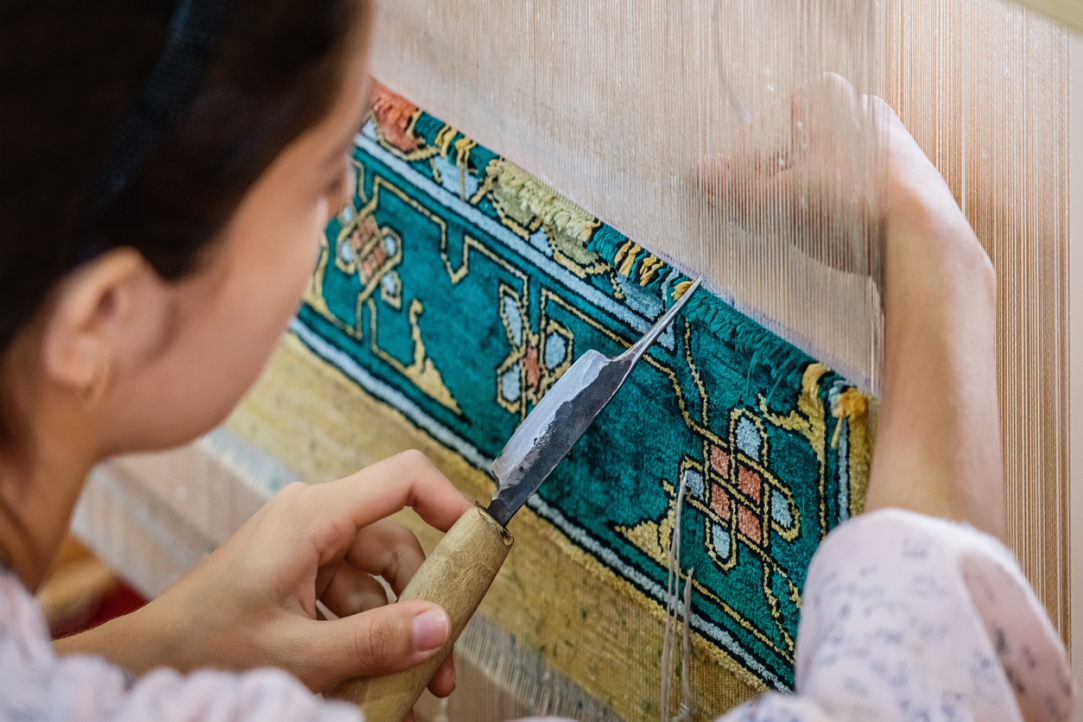‘The Development of Creative Industries Has Become a Priority for Both Russia and Uzbekistan’

The Tourism Development Institute under the Committee for Tourism of the Republic of Uzbekistan and HSE University have signed a cooperation agreement aimed at establishing and developing academic, cultural, and other partnerships in the fields of education and tourism. The initiative for signing the agreement came from the Institute for Creative Industries Development at the HSE Faculty of Creative Industries.
The agreement envisages the creation of educational programmes and the launch of joint projects.
International cooperation in education plays a key role in the development of human capital, the strengthening of scientific potential, and the formation of global academic networks. Partnerships between leading educational institutions provide access to advanced teaching methods, research practices, and double degree programmes, all of which contribute to the training of highly qualified specialists capable of meeting the modern labour market demands.
Such cooperation not only enriches the academic environment but also promotes intercultural dialogue, the development of innovative educational models, and the strengthening of countries’ positions in the international educational landscape.
The first joint initiative launched under the partnership was the international youth competition ‘The Culture of the Republic of Uzbekistan in Contemporary Design,’ organised in collaboration with the HSE Art & Design School, the DAFES Association, the Creative City platform, and supported by the Committee for Tourism of the Republic of Uzbekistan. The committee awarded a prize fund of 10 million, 7 million, and 5 million Uzbekistani soms to the first, second, and third prize winners, respectively.
The aim of the competition is to gather contemporary design solutions based on the intangible cultural heritage of Uzbekistan, emphasise its global significance, and highlight its role in enhancing the country’s tourism potential.

Tatyana Abankina, Academic Supervisor of the HSE Institute of Creative Industries Development, Candidate of Sciences in Economics
‘The development of creative industries has become a priority for both Russia and the Republic of Uzbekistan. Creative individuals are the backbone of the creative economy. A meeting in Vladivostok between colleagues from the Institute for Creative Industries at HSE University and representatives from Uzbekistan, held as part of the Russia–Uzbekistan Educational Forum ‘Education in Creative Industries: Shaping the Economy of the Future,’ laid the groundwork for cooperation in areas such as staff training, joint educational programmes, and collaborative projects in creative fields. The educational and research resources presented by the Institute for Creative Industries Development attracted great interest from our Uzbekistani colleagues at the Tourism Development Institute. In particular, the Creative City platform will serve as a hub for bringing together educational initiatives, creative projects, and individuals. The Genius of Place digital competition platform and the online/offline programme in Management in Creative Industries were also met with enthusiasm. Representatives of the ministry of Uzbekistan expressed interest in HSE University’s methodology and practical approach to assessing the creative potential of Russian regions. The establishment of direct contacts and participation in the international conference hosted by HSE University-St Petersburg provided an opportunity to define specific areas of collaboration and led to the drafting of a Cooperation Agreement between HSE University and the Tourism Development Institute of the Republic of Uzbekistan in the fields of education and science.’

Valery Gordin, Head of the Laboratory for Management in Culture and Tourism at HSE University-St Petersburg
‘The Laboratory for Management in Culture and Tourism at HSE University-St Petersburg has already established ties with the institute. Our Uzbekistani colleagues visited St Petersburg to participate in a seminar on cultural heritage, and our experts gave presentations at the VIII International Forum of Guides, hosted by the institute, focusing on new challenges and pathways for tourism development. We see the most promising areas of future collaboration with the Tourism Development Institute in research on the role of museums in the creation of tourism products in both Uzbekistan and Russia, as well as in the establishment of a professional development system for museum workers and tourism professionals. This will involve creating mechanisms for collaboration between these two sectors.’

Natalia Logutova, Deputy Director of the HSE Institute for Creative Industries Development
‘Enhancing the tourist appeal of regions through cultural heritage, traditional crafts and technologies, as well as developing local brands are major themes that are becoming the focus of research, analysis, and educational content for students across all programmes at the Institute for Creative Industries Development and HSE Art & Design School. Together, we have launched the Creative City platform—a community of professionals in the creative field, a kind of creative map originally built on student projects. Since then, it has expanded beyond HSE and even internationally, uniting projects from various regions and countries. This platform functions as a permanent competition system, gathering the best creative practices for working with local themes and attracting an international expert community. We hope our collaboration with the Tourist Development Institute of the Republic of Uzbekistan will lead to a significant expansion of the range and types of projects, thanks to both students participating in our joint programmes and initiatives exploring the cultural heritage of both countries. With the exchange of experiences, joint research, competitions, and exhibitions, we are looking forward to a long-term and fruitful cooperation.’
Elena Golysheva, Director of the Tourist Development Institute under the Committee for Tourism of the Republic of Uzbekistan, PhD in Economics, Senior Research Fellow
‘Undoubtedly, the signing of the cooperation agreement in education and research—initiated by the HSE Institute for Creative Industries Development—will contribute to the development of creative industries, the establishment of joint educational programmes, and the support of new youth initiatives.
This will help accelerate the promotion of cultural heritage, foster the implementation of innovative ideas, and enable the exchange of valuable experiences. Overall, this partnership is focused squarely on long-term outcomes and the mutual enrichment of academic and professional environments.
It is also essential that the agreement will contribute to training the specialists needed in creative industries. I would like to take this opportunity to once again express our gratitude to our Russian colleagues for their support and assistance in many areas. I have every confidence that our future collaboration will have a positive effect on the continued development of the tourism and creative infrastructure in both Russia and Uzbekistan.’
Alim Mukhitdinov, Head of the Department for Scientific and Innovative Projects at the Tourism Development Institute of the Republic of Uzbekistan
‘Our cooperation with HSE University opens up new horizons for joint research and education in the fields of tourism and creative industries. Signing this agreement between our two institutions is an important step towards the creation of an integrated scientific and educational platform capable of offering a modern perspective on tourism development—one that takes into account cultural, technological, and creative trends.
The Department for Scientific and Innovative Projects at the Tourism Development Institute sees particular value in the exchange of academic approaches, the implementation of joint research, the launch of educational initiatives and youth competitions such as ‘The Culture of the Republic of Uzbekistan in Contemporary Design.’ These projects help to reveal our country’s unique cultural potential and establish new standards in training professionals for the tourism sector.
We hope that this growing cooperation will serve as a strong foundation for a sustainable partnership focused on generating new knowledge, developing human capital, and promoting Uzbekistan’s cultural heritage on the international stage.’
See also:
Intellectual Capital in the Face of Shocks: Russia and Iran Explore Internationalisation
In today's issue of Schola, Mariya Molodchik, Senior Research Fellow at the International Laboratory of Intangible-Driven Economy and Professor at the School of Economics and Finance at HSE University’s Campus in Perm, discusses a joint project with Iran University of Science and Technology, titled 'Internationalization of Companies from Developing Countries: The Role of Intellectual Resources in Response to Exogenous Shocks.'
HSE Researchers Introduce Novel Symmetry-Aware Neural Network Architecture
Researchers at the HSE Laboratory for Geometric Algebra and Applications have developed a new neural network architecture that can accelerate and streamline data analysis in physics, biology, and engineering. The scientists presented their solution on July 16 in Vancouver at ICML 2025, one of the world's leading conferences on machine learning. Both the paper and the source code are publicly available.
Students from HSE and Other Universities Carry Out Research Expedition at New Chersonesos
As part of the Rediscovering Russia student expedition programme, HSE University organised a research trip under the framework of the School for Young Humanities Scholars to the New Chersonesos museum and church complex in Sevastopol. The results of this expedition will form the basis for proposals on educational projects aimed at shaping young people’s historical memory of the role of Chersonesos, Crimea, and the Byzantine legacy in the history of Russian culture and statehood.
HSE Researchers Determine Frequency of Genetic Mutations in People with Pulmonary Hypertension
For the first time in Russia, a team of scientists and clinicians has conducted a large-scale genetic study of patients with pulmonary arterial hypertension. The team, which included researchers from the International Laboratory of Bioinformatics at the HSE Faculty of Computer Science, analysed the genomes of over a hundred patients and found that approximately one in ten carried pathogenic mutations in the BMPR2 gene, which is responsible for vascular growth. Three of these mutations were described for the first time. The study has been published in Respiratory Research.
First Caucasus School on Experimental Research and Cognitive Sciences Takes Places in Adygea
On September 17–20, 2025, the First Caucasus School on Experimental Research and Cognitive Sciences took place at the Gornaya Legenda venue of Adyghe State University (ASU). The event was organised by the ASU Experimental Linguistics Laboratory, the HSE Centre for Language and Brain, and the HSE Centre for Sociocultural and Ethnolinguistic Studies. The school brought together over 50 participants—students, doctoral candidates, and early-career researchers from across Russia, along with lecturers and speakers from France, Serbia, China, Turkey, Kazakhstan, and Uzbekistan.
HSE Scientists Reveal How Disrupted Brain Connectivity Affects Cognitive and Social Behaviour in Children with Autism
An international team of scientists, including researchers from the HSE Centre for Language and Brain, has for the first time studied the connectivity between the brain's sensorimotor and cognitive control networks in children with autism. Using fMRI data, the researchers found that connections within the cognitive control network (responsible for attention and inhibitory control) are weakened, while connections between this network and the sensorimotor network (responsible for movement and sensory processing) are, by contrast, excessively strong. These features manifest as difficulties in social interaction and behavioural regulation in children. The study has been published in Brain Imaging and Behavior.
Scientists Develop New Method to Detect Motor Disorders Using 3D Objects
Researchers at HSE University have developed a new methodological approach to studying motor planning and execution. By using 3D-printed objects and an infrared tracking system, they demonstrated that the brain initiates the planning process even before movement begins. This approach may eventually aid in the assessment and treatment of patients with neurodegenerative diseases such as Parkinson’s. The paper has been published in Frontiers in Human Neuroscience.
Global AI Trends Discussed at International Foresight Workshop at HSE University
At an international foresight workshop on artificial intelligence held at HSE University, Russian and foreign scholars discussed the trends and challenges arising from the rapid development of AI.
'Biotech Is Booming Worldwide'
For more than five years, the International Laboratory of Bioinformatics at the HSE Faculty of Computer Science has been advancing cutting-edge research. During this time, its scientists have achieved major breakthroughs, including the development of CARDIOLIFE—a unique genetic test unmatched worldwide that predicts the likelihood of cardiovascular disease. With the active participation of HSE students, including doctoral students, the team is also working on a new generation of medicines. In this interview with the HSE News Service, Laboratory Head Maria Poptsova shares insights into their work.
HSE University–St Petersburg Holds Summer Intensive Course on Finance for Students from Five Countries
The International Summer School at HSE University–St Petersburg included the intensive course 'New Economic Drivers for Company.' International students explored the realm of applied finance through case studies of Russian companies.


